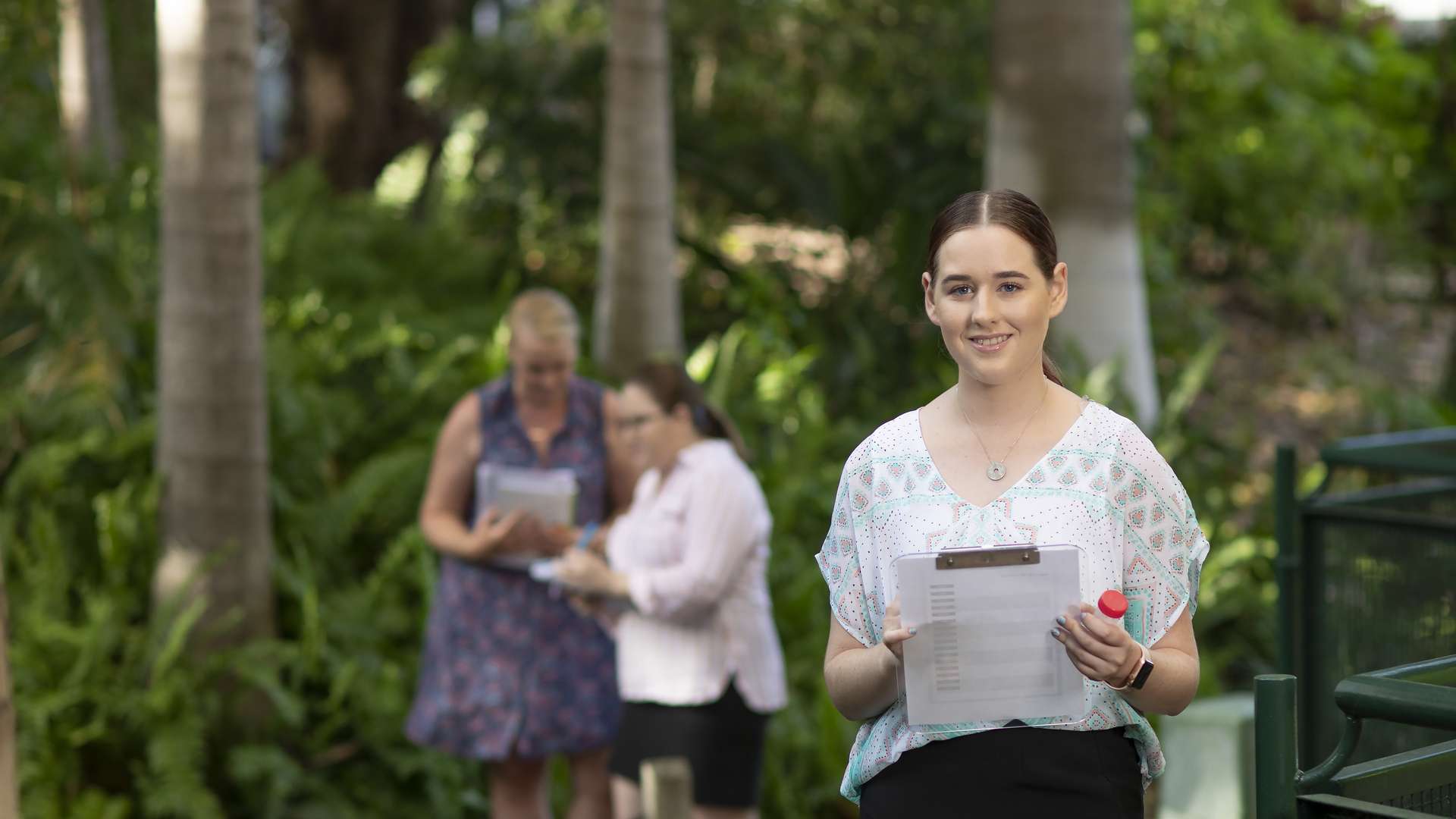Bachelor of Public Health (Specialisation)

Overview
Become a leader in improving the health of communities and the wider population with a Bachelor of Public Health (Specialisation) at CQUniversity. Develop broad skills and knowledge in public health whilst developing specialised expertise in the areas of environmental health or health promotion. Benefit from the support of experienced public health lecturers and authentic work-integrated learning opportunities including opportunities to complete two placement units relevant to your chosen major.
In this course, you will not only develop a broad understanding of evidence-based strategies to address health risks and achieve higher standards of health and well-being, but also apply these strategies in real-world settings. With a strong emphasis on participation, prevention, and partnership with the community, you will build solid foundations of the socio-ecological model of public health. You'll also have the opportunity to develop and maintain community and industry partnerships in promoting public health and participate in the political process to advocate for health, social justice, and equity through contributions to public policy and decision-making. You can choose to major in health promotion or environmental health or opt for a course of study covering a broad range of public health topics.
Health promotion major
In this major, you'll learn to initiate, manage and evaluate a health promotion project. You'll do this by applying relevant theoretical knowledge and strategies.
Environmental health major
You will learn to assess, monitor and evaluate environmental health issues. You'll gain skills to facilitate conflict resolution between agencies, regulated parties and communities. You'll do this by applying relevant law, provision of information and problem solving.
Our public health degree offers you the flexibility to tailor your studies to your unique interests and career goals. With a range of minors to choose from, you can customise your learning experience to suit your needs. During your studies, you will have the opportunity to complete practical placements in real-world settings, enabling you to enhance your employability further and put the skills and knowledge you obtain into practice.
What is public health?
Public health refers to a collection of disciplines that share a common aim - to prevent disease, promote health and improve well-being among the population as a whole rather than focusing on individuals. Some of the most important advances in health internationally over the last century have been public health interventions - including the eradication of smallpox, improvements in workplace safety, reduced morbidity from cholera and decreased trends in tobacco smoking.
Study Experience
- Accredited Qualification
- Online or On Campus
 “
“You need a degree to work in public health because there's a lot of science involved in legislation.
Victoria Keevers
Bachelor of Public Health
Career Opportunities
Completion of the Bachelor of Public Health (Specialisation) will prepare you to pursue employment opportunities in roles such as:
- Environmental Health Officer
- Health Promotion Officer
- Public Health Nutritionist
- Environmental Manager
- Occupational health and safety roles (upon selection of appropriate minor).
Structure & Availability
The course structure and available locations can change depending on when you want to study. You can choose the intake that best suits you in the drop-down menu below.
Available Locations
Your Course
You must complete 24 units (144 credits):
- 1The core structure (8 units)
- 2One major (12 units) and one four-unit minor OR
- 3One major (16 units)
Unit Details
The units you'll study are listed below. Click on a unit to learn more.
Environmental Health
As an Environmental Health graduate, you will be skilled to work in local, state and federal government, in overseas aid, the military (including the army and Air Force as an environmental health officer), as well as in private industry. Create change by working on projects that focus on the link between the environment and human health, such as safe drinking water, safe food, clean air, healthy housing, disaster management, areas impacted by changing environments, and settlement planning to improve health and prevent injury and disease.
Please note that this major is only available for domestic students. Units may be delivered on specific campuses or online, click on the units below to see the options available.
Course Planner
To help you plan your studies and see which unit comes first, if one unit should be completed before another and when you will study each unit, check out our course planners.
Additional Information
Professional Practice - Environmental Health Australia (EHA)
Core
This accreditation entitles graduates with the Environmental Health major to become members of Environmental Health Australia and qualifies them to work as an Environmental Health Officer in those States with legislatory requirements for authorised persons, including Western Australia.
Professional Practice - International Union of Health Promotion and Education
Core
This accreditation makes graduates with the Health promotion major eligible to apply to become a registered Health Promotion Practitioner through the International Union of Health Promotion and Education.
Professional Practice - Environmental Health Australia (EHA)
Environmental Health Major
This accreditation entitles graduates to become members of Environmental Health Australia and qualifies them to work as an Environmental Health Officer in those States with legislatory requirements for authorised persons, including Western Australia.
PBHL12001 Communicable Diseases and Public Health;
MBIO19012 Microbiology;
ENVH12001 Food Safety;
ENVH13002 Environmental Health Risk Management
Public Health in Practice B - PBHL13004
Placement in professional environment relevant to chosen major. Developing experience relevant to professional- specific activities/tasks. Planning and conducting a research project, nutrition project or health promotion program in the workplace.
Public Health in Practice A - PBHL13003
Placement in professional environment relevant to chosen major. Developing experience relevant to professional- specific activities/tasks. Planning and conducting a research project, nutrition project or health promotion program in the workplace.
If you have completed prior study relevant to units within this course, you may be eligible for credit for your past studies. Learn more about credit and recognition of prior learning.
Requirements
To Be Eligible
For your application to be considered, you must meet the following entry requirements.
Student and Course Profiles
View the student and course profiles for this course and learn about CQU's Undergraduate Profile for Term 1, 2024 via our Institute Profile.
During Your Study
While not needed to apply, you'll need to meet the following requirements throughout your studies.
Fees & Scholarships
Indicative First-Year Fee
The Indicative First-Year Fee is the approximate cost of enrolling in this course for one full-time academic year (eight units over two terms) for a Commonwealth Supported Place (CSP) and should be used as a guide only. Your actual fees may vary, depending on the units you select to study and your study load. Check the cost-per-unit spreadsheet available on our fees webpage for the approved unit fees. Fees are reviewed each year and are subject to change. Understanding your fees.
Commonwealth Supported Places
This course has Commonwealth Supported Places (CSPs) available, and as a domestic student, you'll be offered a CSP, provided you meet CSP eligibility requirements. CSPs are subsidised by the Australian Government, meaning you are only required to pay the student contribution rather than full tuition fees.
HECS-HELP Loan
You may be eligible for a HECS-HELP government loan if you are offered a CSP. HECS-HELP is an Australian Government loan scheme that assists you in paying your student contributions. Provided you meet the HECS-HELP eligibility criteria, you may use HECS-HELP to defer part or all of your student contribution fees.
Part of your course costs will include Student Services and Amenities Fees (SSAF). SSAF is charged in addition to your student contribution or tuition fees and is used to help enhance your study experience. There may also be other costs as part of your studies, such as textbooks, technology expenses, travel expenses, professional certifications, uniforms, or vaccinations. Explore other study costs.
We believe a quality education can be for everyone – regardless of background, location, or life circumstances. That's why we offer a variety of scholarships and bursaries that can give you a helping hand with a range of expenses and enhance your employability.
How to Apply
How to Apply
Check what you need to do to apply to study this course.
Your Application Options
Follow These Steps
Extra Admission Information
Prior to applying, take a look at important application dates and learn about our admission considerations, such as information for domestic students with overseas qualifications, indigenous support, and elite athlete, coach and performer support. You should also check out the adjustment schemes that might be available to you and how to access them. You can also explore our offer information to learn more about what happens after you've submitted an application and how to respond to an offer to study with CQU.
Applying for 2026
Applications for 2026 via the Universities Admissions Centre (UAC) open in April 2025.
More information will be available soon.
